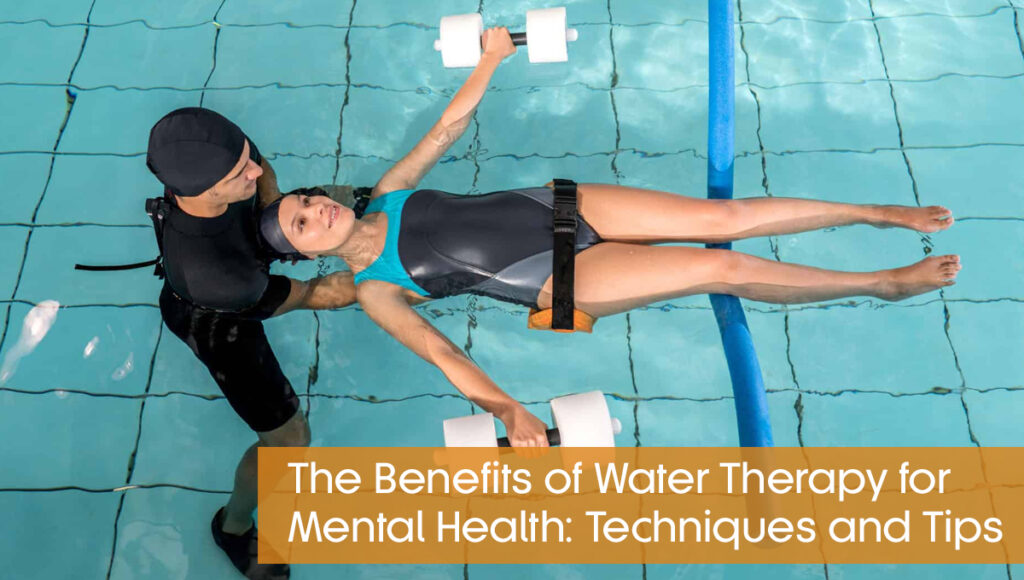In today’s fast-paced world, mental health challenges have become increasingly common. While various therapeutic approaches exist, water therapy offers a unique and effective way to enhance mental well-being. Water Therapy for Mental Health involves using water through activities like hydrotherapy, swimming, or even simple relaxation to improve emotional and psychological states. This holistic approach is gaining traction for its soothing properties and ability to alleviate stress, anxiety, and depression. At Sukino Healthcare, we believe in integrating innovative methods like water therapy to provide comprehensive mental health care.
How Water Therapy Works for Mental Health
Water therapy employs the natural properties of water, such as buoyancy, temperature, and flow, to create a calming environment that benefits the mind. Here’s how:
- Buoyancy Reduces Physical Strain: Floating in water relieves the body of gravitational stress, promoting relaxation. This physical ease translates to a mental release, reducing tension and anxiety.
- Temperature Modulation: Warm water soothes muscles and nerves, creating a calming effect. Cold water, on the other hand, invigorates the senses and boosts alertness.
- Sensory Stimulation: The gentle movement of water stimulates the senses, which can help individuals with sensory processing disorders or those experiencing heightened anxiety.
Techniques of Water Therapy for Mental Health
1. Hydrotherapy
Hydrotherapy involves immersing the body in water to leverage its therapeutic effects. Warm baths with essential oils, for example, help reduce cortisol levels the stress hormone while promoting relaxation. Whirlpool baths and jet sprays can also target specific muscle groups, alleviating physical discomfort that often accompanies mental stress.
2. Swimming and Aquatic Exercise
Swimming is not only an excellent physical activity but also a mental health booster. The rhythmic movements and controlled breathing required during swimming create a meditative state, improving focus and reducing symptoms of anxiety. Aquatic exercises, like water aerobics, combine the benefits of physical fitness and emotional upliftment.
3. Watsu Therapy
Watsu, a blend of water and shiatsu, is a specialized therapy where a practitioner gently moves and stretches the client in warm water. This technique helps release deeply held tension and fosters a sense of trust and emotional balance.
Mental Health Benefits of Water Therapy
1. Stress Reduction
Water therapy induces a state of relaxation, lowering stress hormones and enhancing the production of endorphins. Whether it’s soaking in a warm bath or floating in a pool, the calming properties of water can significantly ease daily stressors.
2. Improved Sleep Quality
Insomnia and other sleep disorders often stem from stress and anxiety. Warm water therapy before bedtime helps relax the body and mind, making it easier to fall and stay asleep.
3. Enhanced Mood and Emotional Stability
Engaging in water-based activities triggers the release of dopamine and serotonin, neurotransmitters associated with happiness and well-being. This is particularly beneficial for individuals dealing with depression.
4. Increased Mindfulness
The sensory experience of water encourages individuals to focus on the present moment, fostering mindfulness. This is particularly helpful for those struggling with overthinking or chronic anxiety.
5. Physical and Mental Resilience
The combination of physical activity and mental relaxation in water therapy builds resilience. Regular sessions improve overall stamina and emotional coping mechanisms, enabling individuals to handle challenges more effectively.
Tips for Effective Water Therapy
- Set the Right Environment: Create a calming space by using aromatherapy, dim lighting, or relaxing music during water therapy sessions.
- Stay Consistent: Regular sessions amplify the benefits. Aim for at least two to three water therapy sessions per week.
- Personalize the Approach: Choose techniques that resonate with your preferences, whether it’s swimming, a warm bath, or a guided watsu session.
- Seek Professional Guidance: Consult with experts at Sukino Healthcare to design a water therapy plan tailored to your mental health needs.
- Combine with Other Therapies: For holistic care, integrate water therapy with other practices like yoga, meditation, or counseling.
Why Choose Sukino Healthcare for Water Therapy?
At Sukino Healthcare, we are committed to providing personalized and innovative care solutions. Our team of experts integrates water therapy into comprehensive mental health treatment plans, ensuring every individual receives the support they need. With state-of-the-art facilities and a compassionate approach, Sukino Healthcare is your partner in achieving mental wellness.
Conclusion
Water Therapy for Mental Health is a natural, effective, and accessible way to enhance emotional well-being. By incorporating techniques like hydrotherapy, swimming, and watsu, individuals can experience reduced stress, improved sleep, and heightened mindfulness. At Sukino Healthcare, we advocate for holistic approaches like water therapy to empower individuals on their mental health journey. Dive into the healing power of water and discover a calmer, happier you.
We are India’s first comprehensive continuum care provider. We provide multidisciplinary out of hospital care to acute and post-acute and chronically ill patients at our critical care facilities and your home.


